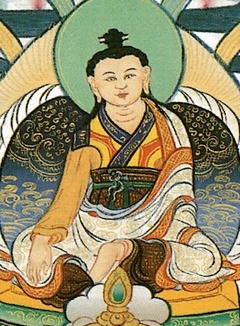The Character of the True Nature of Reality
The Character of the True Nature of Reality[1]
by Khenchen Ngawang Palzang
Jigme Lingpa wrote the following in his Treasury of Qualities:
Let us consider the character of the true nature of reality we have at hand: while it has a presence, it does not manifest to the eye; while it does not exist, it is limitless; it does not fall to either metaphysical extreme; it holds to the middle.
Still, since it does not exist, it is beyond beginning and end, arising and cessation, coming and going, the three times, and center and edge. There can be no ground for liberation in what transcends effort and accomplishment. This is because liberation happens naturally, the way that written strokes disappear on water's surface. Liberative conditions are irrelevant because the true nature of reality is all-pervasive.
Because it is groundless and rootless,[2] in[3] the experiential expanse beyond word, thought, and expression—in the very coemergence of natural lucidity and profound insight that sees the true nature of reality directly—there has never been the slightest trace of mental afflictions or swarms of discursive thoughts. And there has never been their absence. They are not cast off through abandonment;[4] they are not purified through refinement; they are not changed through transformation; and they are not freed by being liberated.
Not understanding this results in all the factors of dualism—such as things to clear away and the subject that clears them. [Yet], because these are ontologically the same,[5] it is misguided to talk of purification and freedom as two different [stages].[6]
Now, let us consider the following verses:[7]
How wonderful! The essence of mind-in-itself is awareness.
Rest, unaltered, uncorrupted, naturally settled just as things are!
My unaltered mind, this naked awareness,
Has always been the same as the mind of the buddhas.
And:
Uncultivated awareness, supreme spontaneous presence,
Is to rest in a state of sustained awareness without making any corrections.
| Translated by Joseph McClellan, 2025.
Bibliography
Source Texts
'jigs med gling pa. "'bras bu lhun grub chen poʼi rnam par bzhag pa ste leʼu bcu gsum paʼi ʼgrel pa." In gsung ʼbum ʼjigs med gling pa, 2:601–882. v. 29-37. Gangtok, Sikkim: Sonam T. Kazi, 1970–1975. BDRC MW1KG10193_4D5EC3.
mkhan po ngag dgaʼ. gsung ʼbum ngag dbang dpal bzang, vol. 8. pp. 69–70. Khreng tuʼu, n.d. BDRC MW22946.
Version: 1.1-20251028
-
We have supplied this working title. In the edition's table of contents, the text is assigned the title 'di ltar sogs ("Like this, and so forth"), based on the text's first words. ↩
-
The Khenpo Ngaga edition reads gzhi dang rtsa ba med pa/, which does not clearly indicate the clause's grammatical function. The Jigme Lingpa edition, on the other hand, reads gzhi dang rtsa ba med pas, indicating that the clause is providing a reason for the point that follows. ↩
-
Here, the Khenpo Ngaga edition reads na ("in"), while the Jigme Lingpa edition reads ni (a partical that marks the main topic). ↩
-
The Khenpo Ngaga edition reads spangs pas mi spongs [imperative]. The Jigme Lingpa edition reads spangs pas mi spong [present]. ↩
-
Here, "ontologically the same" translates rdzas gcig ("single substance"), which is often used in this technical, metaphysical sense. ↩
-
Since the passage ends abrubtly here, it seems appropriate to refer to the ensuing passage in Jigme Lingpa's text, which clarifies the passage's intent:
འདི་ལྟར་དག་གྲོལ་གཉིས་སུ་བྱེད་པ་དེ་ཡེ་ཤེས་ཀྱིས་བྱེད་ན་སེམས་ཀྱིས་ཡེ་ཤེས་མ་མཐོང་། ཡེ་ཤེས་ཀྱིས་སེམས་མ་མཐོང་བས་ལྷན་ཅིག་ཏུ་མི་འདུ་བའི་དངོས་འགལ་ལ་ཐ་སྙད་དེ་མི་རུང་ལ། དེ་བཞིན་དུ་འདས་མ་འོངས་རྫས་འགལ་བས་ཕྱི་མས་སྔ་མ་སྤངས་པའང་མེད་དེ། གཅིག་ཡོད་དུས་གཅིག་འགག་ལ། དུས་མཉམ་ན་སྔ་ཕྱི་འཆོལ་བས་སྤང་བྱ་གཉེན་པོ་དང་། གཉེན་པོས་སྤང་བྱ་བྱས་པར་འགྱུར་ཏེ། སེམས་རྒྱུན་གཅིག་ལ་དུས་མཉམ་པས་སོ།།
If purification and freedom were brought about in two stages by pristine awareness, then mind would not behold pristine, and pristine awareness would not behold mind. Speaking this way would be misguided because they would be absolutely contradictory (dngos 'gal) and so they could never be co-present in synchronicity. Similarly, neither is it the case that since past and future are contradictory, what is late does away with what was early. When [only] one is present, the other is not. However, when there is simultaneity, early and late are mixed up, so what is to be abandoned would serve as antidote, and antidote would serve as the thing to be abandoned. This is because they are present simultaneously within one mind's continuum. ('Jigs med gling pa, p. 628)
This is followed by a clarifying passage from the Kissing of the Sun and Moon Tantra (nyi zla kha sbyor):
དེ་བཞིན་ཉིད་དུ་མ་རྟོགས་ན། །རྣལ་འབྱོར་ལུས་དང་གྲིབ་མ་བཞིན། །དེ་ལས་དེ་ཉིད་རང་འབྱུང་བས། །སྤངས་པས་སྤོང་བ་མ་ཡིན་ནོ། དེ་བཞིན་སྦྱངས་པས་ཀྱང་ནི་མིན། །བསྒྱུར་བས་ཡང་ནི་མི་འགྱུར་རོ། །འགྱུར་མེད་སྙིང་པོ་མ་རྟོགས་ན། །ཤེལ་གྱི་བྲག་གམ་གཡུ་རྡོ་བཞིན། སྦྱང་ཞིང་བཞུ་བར་ནུས་པ་མིན། །རང་བཞིན་གྱིས་ནི་གནས་དག་ཏུ། །རྣལ་འབྱོར་ལྡན་པ་ཡི་ནི་བརྟག །དེ་བཞིན་ཞི་བ་ཉིད་ཀྱང་མིན། མངོན་སུམ་ལྷག་མཐོང་མ་ཤེས་པ། །རི་རབ་རི་ཡི་རྒྱལ་པོ་བཞིན། །སུས་ཀྱང་གཞིག་པར་ནུས་པ་མིན། །གཉན་པོ་ཡིས་ནི་གྲོལ་བ་མིན། མ་བཙལ་རང་དག་མ་ཤེས་པར། །རྙོག་པ་སངས་འདོད་ཆུ་རྙོག་བཞིན། །ཕྱི་ཕྱིར་སངས་པ་མ་ཡིན་ནོ། །དེ་ཉིད་དྭངས་ཀྱང་ཆོས་ཉིད་མིན། རང་སྣང་ལྷུག་པ་མ་ཤེས་པར། །ཐ་མལ་བླུན་པོའི་སྣང་བ་བཞིན། །མངོན་ཞེན་བཟློག་པ་མ་ཡིན་ནོ།།
If you do not realize suchness,
It will be like a yogi's body and its shadow.
Since its shadow arises naturally from the body,
It is not cast off through abandonment.
Likewise, it is not refined away.
Nor can it be changed through transformation.
If you do not realize the unchanging essence,
You will not be able refine or smelt it,
Just as a crystal or turquoise [cannot be made more pure].
It abides in purity by its very nature.
Yogins should examine this.
Likewise, it is not merely a state of peace.
When you do not know with insight that directly perceives [the true nature of things]
[This lack of knowing] is like Mount Meru, king of mountains:
No one can destroy it;
It cannot be liberated through antidotes.
When you do not understand your own purity that cannot be sought,
You are like turbid water that longs to be clear;
It will not become clear in stages.
Though that water may become limpid, that is not the true nature of things (dharmatā).
When you do not understand the free and easy unfolding of self-appearances,
Then your perceptions are like those of an ordinary fool
And obsessive clinging is not averted. ('Jigs med gling pa, pp. 628–629) ↩ -
We do not find the following unattributed verses in any databases of the literature. The use of "zhes" suggests that they are quotations rather than the author's own compositions. ↩
